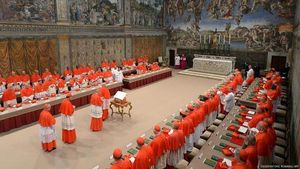Norfolk farmer Tony Martin, who gained notoriety for shooting dead teenage burglar Fred Barras two decades ago, has died at the age of 80, confirmed by close friend Malcolm Starr. Martin passed away on Sunday afternoon at Wisbech Hospital, after suffering from complications following a stroke he endured months prior.
Martin's life became enmeshed with controversy after the fatal incident on August 20, 1999, when he shot Barras, aged 16, and injured 29-year-old Brendon Fearon at his isolated farmhouse, known as Bleak House, located near Wisbech. The teenagers had traveled from Newark, Nottinghamshire, intending to burglarize Martin's home, where he had long stored valuables and antiques.
Initially found guilty of murder and sentenced to life imprisonment, Martin's conviction was later reduced to manslaughter on the grounds of diminished responsibility; he served three years before being released. The case stirred national debate about homeowners’ rights to defend their property against intruders and the morality of Martin’s actions. Some viewed him as a vigilante, whereas others lauded him as a defender of personal property.
According to Starr, Martin passed away peacefully surrounded by friends, highlighting the immense toll the incident and the subsequent trial had on him. "He never fully recovered from the turmoil of the shooting and its aftermath," Starr said. "He was honest to a fault, and this may have contributed to the lengths of his incarceration. He never had any remorse, but it deeply affected him. He was simply defending his property."
Martin’s life was marked by strife following the incident. After enduring several break-ins at his home prior to the shooting—claiming to have been targeted ten times and suffering losses of around £6,000—he maintained firearms for protection. On the night of the fatal encounter, he woke up to the intrusion, assumed they posed imminent danger, and fired his weapon, hitting both intruders.
Starr reflected on their earlier interactions, mentioning how he first met Martin when he drove his tractor to Starr’s office to discuss local police matters. "He was certainly eccentric but also very straightforward. His lifestyle after his release showed signs of the demoralization he faced. He lived quite literally out of his car for many years because he feared facing another intruder," Starr recounted.
His conviction, alongside the compelling nature of the case, captured significant media attention, eventually leading to Martin’s life being dramatized in the Channel 4 production, The Interrogation of Tony Martin, which outlined the summer night where his life irreversibly changed. The drama reflected on the ethical questions surrounding self-defense and how society views individuals taking justice—or what they perceive as justice—into their own hands.
Even after his release, Martin remained adamant about his choices, claiming he acted purely out of self-defense. He once stated, "I don’t regret anything – what was I supposed to do? Hide under the bed clothes?" His remarks spurred discussions around the need for laws providing clearer definitions of self-defense. This led to the introduction of the Crime and Courts Act 2013, allowing for 'reasonable force' to be employed by homeowners against intruders, applicable after Martin's high-profile case highlighted the anxieties faced by citizens attempting to defend their homes.
Martin's mental health deteriorated post-release, often struggling with depression and living under duress, as he felt the law treated him unfairly during the dispute. Reclusive after the shooting, Martin's farmhouse stood neglected and falling apart, mirroring the disrepair of his own mental state throughout the years. It was reported he didn't live there after his release, choosing to stay instead with friends.
He remained vocal about his beliefs even decades later, without remorse for the unintended consequence of Barras’s death. "What goes around, come around," he once expressed, affirming his stance on how he viewed intruders. Martin's comments reveal how he saw his actions, rooted not only in personal beliefs about property but also reflecting larger concerns about the changing nature of law and justice.
Martin's death brings closure to his tumultuous and controversial legacy, leaving behind many questions about the balance between self-defense and vigilantism, as well as the psychological impacts of living under the cloud of infamy. His saga remains woven deeply within discussions about personal safety and the legal protections afforded to individuals defending their homes across the United Kingdom.



